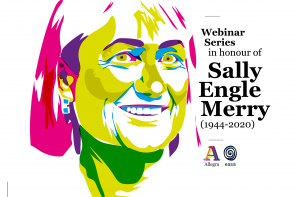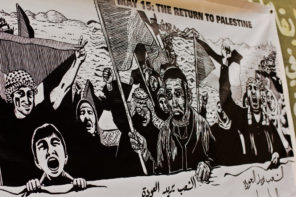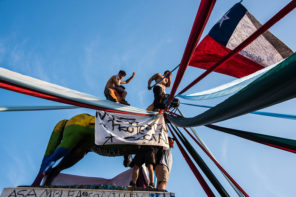The twenty-five years since the end of the Cold War have been a historical watershed for the project of international governance embodied by the United Nations, a project forged from the tragedy of the Second World War and its unprecedented levels of violence. Indeed, the 1990s saw the multiplication of UN agencies, international laws and transnational human rights networks, all of which endorsing an agenda for improving the world and bringing about a new one in which the impregnability of state borders would be gradually replaced with the authority of international law. But if the post-Cold War was a giddy time of possibility, it is worth considering the present status of these ideals as the post-Cold War gives way to a world marked by chronic patterns of socioeconomic inequality which set limits on structural change in places where it is most needed.
How did we get there ? Why do organizations put in place in order to promote justice in the world seem unable of doing so ? The idea for this workshop comes from the realization of a certain disconnect between the progressive ideals upheld by institutions of global governance and the rather dull nature of the bureaucratic labour that constitutes their everyday. Building on the latest advancements in the anthropological study of bureaucracies, policy and audit cultures, this workshop examines global governance from the perspective of actors involved in international institutional processes. It uncovers the paradoxes, potentials and unexpected and surprising effects of mechanisms grounded in a wider social and political field and constituted through specific encounters, institutional codes, norms and knowledge practices, and documentary processes. It seeks to understand the reasons for which the great utopias of the past century have taken such complex bureaucratic forms and the ways in which these bureaucratic processes attempt to translate utopian ideals into tangible facts in the world. Moving away from Weberian accounts of bureaucracies as sites where the disenchantment of the world is best examplified, the workshop conceives bureaucratic administration as just another arena for social life and political action, an arena with both constraining and enabling potentialities.
Venue: Graduate Institute Geneva, Switzerland
Date: 29-30 June 2017
Conveners: Julie Billaud and Alessandro Monsutti
Funded by the Swiss National Science Foundation, hosted by the Graduate Institute Geneva and co-organized with Allegra Lab.
ABSTRACTS
Elif Babül, Mount Holyoke College
The risky Business of Governance: Ambiguity, Opacity and Uncertainty in Bureaucracy
This presentation focuses on the elements of risk and ambiguity that is inherent to bureaucratic organizations at both national and transnational levels. These elements come to the fore particularly during transnational standardization processes, which forges encounters between the representatives of national and international bureaucracies. Drawing on my forthcoming book on the EU-led bureaucratic reform in Turkey and the human rights training programs for Turkish government workers, I argue that transnational standardization magnifies the instability of national bureaucratic fields, despite its alleged goal to institute coherence and stability. Rather than seeing this as a specific condition of “non-Western bureaucracies,” I propose to consider risk and ambiguity as inherent to the bureaucratic form in general. Ethnographic studies that reveal the prevalence of cynicism and secrecy in the everyday operations of states in various places testify to this commonality.
Andrea Ballestero, Rice University
The techno-legal devices of humanitarian water: Towards a non-cinematic future
There is hardly any humanitarian concern that brings together such a diverse group of parties as the lack of clean drinking water. Corporations, Hollywood stars, church groups, governmental officials, and everyday citizens are easily involved in humanitarian efforts to drill wells, treat water, and provide sanitation. The highly visible technological devices that they rely upon for their laudable efforts are accompanied by a series of less visible techno-legal devices. These techno-legal devices proliferate as bureaucrats, public servants and elected officials do the deskwork required to bring the dream of clean water for all closer to the messy reality of organizing collective projects within political and jurisdictional boundaries that continue to defy the practical engagement with planetary scales.This paper offers an overview of three such techno-legal devices – a) formula, b) index and c) list – to argue that the future-making capacities of humanitarian mobilizations are deeply entwined with these legal, epistemic, and economic artifacts. More broadly, I argue that in order to understand the future of water we must step outside our obsession with cinematic futures, that is with futures determined as images of how things should or can be. Instead, I suggest, we need to engage with the futures impregnated in techno-legal architectures. By analyzing how Costa Rican public officials engage with said architectures in three cases, I want to suggest a more processual understanding of the future that challenges the linear separation between it, the present and the past.
Julie Billaud, Allegra Lab, University of Sussex, ICRC
Auditing International Law: Bureaucratic Utopias at the UN Human Rights Council and at the ICRC
The UN Human Rights Council (UNHRC) and the International Committee of the Red Cross (ICRC) in Geneva are two institutions responsible for guarding international law. While the ICRC is primarily concerned with International Humanitarian Law (IHL), the UNHRC focuses on human rights (HR). By comparing how each organization implements its mandate; I aim to identify the contrasted ways in which they envisage and relate to the future. I focus on the Universal Periodic Review (UPR), a human rights monitoring mechanism put in place in 2008, with the aim of ‘improving the human rights situation on the ground of each of the 193 UN member states’. I then move on to analyse activities carried out by the ICRC meant to protect various categories of ‘victims’ (prisoners, wounded and sick combatants, civilians) in times of war.
The two organizations have a different history and consequently, different modes of action and understanding of how the world ought to be. The ICRC echoes the classic appeal to humanitarianism rooted in war: responding to a moment of suffering that appears both exceptional and gratuitous. Its protection activities therefore seek to remain a minimal and temporary response, not the basis for a new regime. Its perspective combines anti-utopian skepticism and pragmatism toward what humanitarian aid can achieve with a near utopian sense of engagement in the cause of ‘humanizing war’. Comparatively, the UPR embraces a broader agenda for reforming the world and bringing about a new one in which basic human rights would be granted to everyone. It seeks to achieve this primarily through bureaucratic interventions mobilising the expertise and leverage power of actors and institutions with contrasted knowledge, objectives and agendas. In other words, while the ICRC considers war as an unavoidable evil that has to be tamed by international law; the UPR offers a vision of the future whereby certain universal principles – equality, impartiality, cooperation, transparency – and all human rights (economic and social as well as civil and political rights) would be globally respected. Looking at each organization’s ‘audit’ practices, this paper is an attempt to decipher their ethos and worldview and to highlight the hopes, frustrations and disappointments they generate among practitioners.
Jane K. Cowan, University of Sussex
Reviewing human rights as Greece collapses: debt, austerity measures, time, administrative subjectivity and bureaucratic appeal against dystopia
This presentation begins with a puzzle: when Greece’s first Universal Periodic Review (UPR) was carried out in May 2011, a full year after the signing of its first debt ‘bailout’ by European institutions (‘the Troika’ composed of the European Union, the European Central Bank and the International Monetary Fund) which resulted in reduced pensions, radical cuts in social spending, plummeting living standards and months of street demonstrations, why was ‘the Greek crisis’ barely mentioned—by fellow states, NGOs or the Greek government itself? Why, at a moment when austerity measures were already beginning to threaten the rights to food, health, water, shelter, decent wages and working conditions of all Greek citizens and inhabitants, were issues of basic social and economic rights not mentioned at all, or only raised (in a few cases) exclusively in relation to migrants and refugees, and occasionally to Roma? I start by considering how the human rights situation in Greece was represented in UPR documents and in the ‘interactive dialogue’ of its May 2011 review, and explore how—and to an extent, why—a particular ‘partial’ and ‘selective’ visibility of human rights violations was produced. I intend to use this case as a way of opening up questions about the possibilities and limits of human rights auditing in a context of extreme and dramatically expanding debt, muscular neoliberal ‘reforms’ and deepening structural violence.
In the second part of the presentation, I describe an emerging strategy that I noticed in 2015-2016 (though it had started earlier) in which various parties used the system of both European and UN human rights committees to evaluate the human rights consequences of Troika-imposed austerity measures, as part of a longer effort to alter austerity policy. As part of this, I consider an interchange (January 2016) between myself and a Greek Ministry of Foreign Affairs senior legal counsel who is explaining to me his government’s preparations for Greece’s second UPR in May 2016 and its stance in relation to austerity measures and human rights. My interlocutor’s account deftly navigates diplomatic circumspection, the conveying of official positions in an unofficial interview and description of masterful bureaucratic manoeuvring in probably doomed, yet hopeful, resistance to a dystopic future. What does this one case suggest about ‘administrative subjectivities’ and about using bureaucratic procedures of human rights monitoring as a kind of weapon of the weak?
Miia Halme-Tuomisaari, Allegra Lab, U of Helsinki & Turku
The Banalization of Good: Human rights bureaucracies and the exhausted utopia of world change
Back in the 1940s Eleanor Roosevelt – one of the key figures of the dawning UN human rights framework – identified NGOs as the ‘curious grapevine’ that would be needed to bring the abstract promises of the Universal Declaration of Human Rights (UDHR) to life. This statement inspired thoughts of devoted activists who would – without exhaustion – commit themselves to the cause of advancing human rights around the world, stopping at nothing before the world was improved and human rights had become an integral part of modernity.
Seven decades later this promise appears in many ways as having been fulfilled: we have witnessed a seemingly infinite proliferation of human rights institutions, initiatives and artefacts, accompanied by a vast international professional community of human rights experts and advocates. Simultaneously something feels off: the human rights cause appears to have lost its zing, its dedication and momentum, at least in part; it appears to have increasingly become ‘business as usual’.
This paper explores this transformation via a series of glimpses: it visits a Finnish ministry where civil servants prepare Finland’s human rights reports, a session of a UN treaty body where these reports are processed, a discussion with a parliamentarian to consider the ‘impact’ that human rights reporting may have. It contrasts these glimpses with moments of passionate engagement and enthusiasm – embodied either in recollections of by-gone decades by ‘old-timers’, or the enthusiasm of UN and NGO interns aspiring to become full participants in the community of practice of human rights experts.
Via these glimpses this paper examines the dynamic of enthusiasm and boredom, the transformation of commitment to disinterest and back. Ultimately it discusses the ‘taming’ of the promise for utopian world change via the ‘banalization of good’ via infinite bureaucratic procedures which exhaust both their participants and the enthusiasm that got the entire human rights phenomenon started back in the 1940 – or was the story ever this simple?
Grégoire Mallard, Graduate Institute in Geneva
The Art of Simulation: Speech Norms and Social Glue in Middle East Disarmament Talks
How do international security experts and policymakers come to talk about the future when their respective countries are at war? Do specific speech norms prevent diplomatic discussions from turning into acrimonious attacks or deceptive manipulations? This article argues that the use of simulations based on what I call “forward analogies” (when a foreign past-present relation is compared to one’s present-future relation) allow nuclear disarmament experts to productively engage in diplomatic talks in a particularly hard context: the deliberations of the Weapons of Mass Destruction (WMD) Free Zone in the Middle East. In situations in which diplomacy is blocked by the unwillingness of parties to start negotiations, this article claims that the projection of another region’s past (here, Europe in the 1950s) onto the future of the region (here, the Middle East of the 2020s) can serve a useful constitutive purpose in diplomatic talks. Indeed, such simulations help “constitute” the reality of regional orders when their ontological status as objects of deliberation and intervention is problematic. Furthermore, by encouraging role-shifting strategies, simulations also turn diplomats into students and commentators of a history that is foreign to them, which allows them to focus on forward-looking deliberations rather than on the contentious discussion of their own past and present grievances.
This article is based on a series of discontinuous observations in more than a dozen track-II talks on the WMD Free Zone, which took place from 2008 up to 2014. These observations have been conducted using a methodology that I call “alert participation” rather than “participant observation.” Conducting “alert participation” requires to challenge certain objectivist epistemological assumptions often found in the literature on epistemic communities and transnational fields. In particular, alert participation helps us to analyze from within the temporal underpinnings of these talks—e.g. the “punctured” or discontinuous temporality in which these meetings take place, which alternates between thin and thick moments of encounters. Thus, the article not only discusses the cognitive models and speech norms exemplified by these simulations, but the social glue and strategic logics that animate the inner circle of meeting organizers. The article concludes that active participation of the sociologist/historian into the organization of such talks promises important analytical payoffs for social scientists.
Giulia Scalettaris, Université de Lille
The bureaucratic quest for Refugeestan: professional practices and habitus of the UNHCR’s humanitarian officials
This paper contributes to the reflection on the bureaucratisation of utopias, drawing on my work on the United Nations High Commissioner for Refugees (UNHCR). It looks at the relationship between utopia and bureaucracy in the action of this global humanitarian agency whose expansion has gone hand in hand with its bureaucratisation. We will first consider UNHCR’s utopia at the beginning of the XXIst century. The dream of Refugeestan – an island where the organization could welcome and settle all the world’s refugees – reveals the historically-constructed way in which the UNHCR conceives its mission within the national order. It appears that while bureaucracy hampers change within the UNHCR in many ways, it is the organization’s nationalist view, rather than its bureaucratic functioning, what explains the agency’s inability to offer effective solutions to the world’s refugees. Bureaucracy, by contrast, is essential to understand the way the UNHCR operates and the habitus of its staff. We will therefore turn to examine how the nationalist worldview and the permanently frustrated quest for Refugeestan translate into the daily administrative practices of the organization, and how bureaucratic procedures and moral aspirations jointly shape the habitus of the UNHCR’s humanitarian officials.
Nayanika Mathur, University of Sussex
From Extractivism to Utopianism: Transparency and Accountability Measures in India since the 2000s.
This paper analyses the transparency and accountability measures undertaken by the Indian state over the past decade with a focus on their impact on the everyday functioning of the state. The claims are drawn from over a decade of research with the frontline bureaucracy in different parts of India through the deployment of varied methodologies, which include long-term participant observation in government offices, extensive surveys, interviews, and readings of secondary data sets. I argue that transparency and accountability mechanisms have taken two broad forms in India thus far: 1. A rights-based approach that works through the passage of laws and deployment of strategies that confer entitlements to citizens; and 2. An emergent reliance on new technologies to fix the problems of corruption, inefficiency, slowness, and opacity in the state. I conceptualise the first sort of transparency and accountability mechanisms as inherently ‘extractive’. They work primarily through strengthening the traditional tools of functioning of the Indian state, especially its long-standing reliance on procedure, paper, and files. The second, rapidly-evolving technological approach is starkly utopian with utopia here understood critically as a state of being that might be deeply desired but does not-yet-exist. There is a deep irony in extractive accountability for it can function only in and through strengthening the very instruments of the state i.e. the very entity it hopes to reform. In contrast, the move to techno-fixes believes in a radical rewiring of the state through the introduction of an entirely new technological infrastructure that is, at present, a distant dream for large swathes, if not the entire country. Extractive accountability might have set up limitations in the radical potential of transparency and accountability measures. Yet, it does not possess the destructive capacities that inhere in the on-going move to technologise all interactions with the state. By outlining the shift from extractivism to utopianism, I demonstrate how easily the seemingly benign public goods of transparency and accountability can usher in a dystopic present.
Maria Sapignoli, Max Planck Institute for Social Anthropology
Fragility and Hope in the UN’s Initiatives for Indigenous Peoples
The fragility of the UN comes into tension with its need to promote a sense of hope among its participants. The UN’s initiatives in support of the global indigenous movement are based on an inherent contradiction: they depends for their effectiveness on a sense of possibility among its participants (UN bureaucrats, experts, indigenous and state delegates), while in practice officials and advocates working every day with the category of indigenous peoples deal with the constraints of their participation and obstruction of their vision. A central source of fragility in justice causes is the use by some states of what I call the “violence of repetition,” the form of discursive power that takes effect through reiteration, with simple messages conveyed the same way in multiple venues year after year. One response to the hope/fragility tension lies in a distinct approach to time, in which progress is measured in decades rather than months or years. In these conditions, hope serves not only as a source of motivation but as a filter for knowledge production, in which ambitious aspirations for reform become the ultimate reference point for legitimate knowledge.
Niels Nagelhus Schia, Norwegian Institute of European Affairs
Bureaucrats of cyberspace: The making of connections and disconnections at international multistakeholder conferences
This paper focuses on how spaces and values are produced at a relatively new empirical field, international cyber politics. The very first UN resolution pertaining to this topic was adopted in 1999. This resolution was the starting point for a multilateral, intergovernmental effort to address cyber security. Since then, and in particular the last five years, the pace of policymaking has increased rapidly and produced clear pathways for international cyber politics, the most prominent of these concern cybersecurity, cybercrime and internet governance. In this paper I describe and discuss how these new fields of international politics are constituted and produced by frequent international and multistakeholder conferences. Leaning on Mary Douglas and her way of describing how individuals come to share thoughts through institutionalization processes “… constructing a machine for thinking and decision-making on their own behalf” (1986: 63) the analytical departure is grounded in an anthropology of institutionalization and bureaucracy. I continue with Heyman (1995) (who noted the need to put power back into the anthropology of bureaucracy) by investigating how bureaucratic taxonomies are being made at international cyber conferences.
Isabelle Schulte-Tenckhoff, Graduate Institute, Geneva
‘Indigeneity’ at the UN: critical reflections on a progress narrative (and its dark side)
This paper looks back at forty years of international debates and controversy over indigenous rights, informed by the author’s more or less involved participation in them. Starting with the 1977 NGO conference on discrimination against indigenous peoples in the Americas, the three decades until the adoption of the UN Declaration on the Rights of Indigenous Peoples in September 2007 witnessed a series of developments that established a consistent indigenous presence within the UN system. These include, among others, the establishment of two working groups; the elaboration of ILO Convention N° 169 (1989); a series of important studies – notably on treaties, land rights, and cultural property – carried out by UN experts; and the establishment of the UN Permanent Forum on Indigenous Issues (2000). Over the last decade, since the reform of the UN human rights system launched in 2007, the ‘mainstreaming’ of indigenous issues within the UN system seems to have reached completion. It will be argued that this is at the expense of the rights of indigenous peoples, however. To make my point, I will look at some instances of the efforts deployed by the UN bureaucracy to co-opt and contain indigenous attempts at counter-hegemonic articulations.
Shaila Seshia Galvin, Graduate Institute of International and Development Studies
Inspecting Inspections: Interpreting and Mediating “Organic” in Uttarakhand, India
In India, burgeoning domestic and global demand for organic food led to the establishment of nationally-defined organic standards in 2001. Breaking from the technoscientific paradigms of the Green Revolution and genetic modification, the articulation of these standards opened up an historically distinctive opportunity for Indian farmers to establish agrarian utopias through certified organic agriculture. Such standards introduce new requirements for farmers in India who, in their aspiration to attain certified organic status, have become the subjects of audit cultures through new forms of surveillance and inspection. Based on ethnographic research conducted in the state of Uttarakhand, this paper places focus on the certification inspector, a figure all-important but often invisible in contemporary processes of organic production and sustainable agriculture in India and elsewhere. While the work of these inspectors may seem to entail straightforward compliance monitoring, this paper shows how inspectors are routinely called on to interpret, translate, and mediate between internationally accepted organic standards and situated agrarian practices.
Lukas Schemper, University of Vienna
Utopia and international organization history: preliminary observations with a focus on disaster relief
This contribution looks at the interplay of utopia and bureaucracy in the history of international organizations. It argues that a portion of utopianism and overestimation of one’s capabilities was the necessary ingredient for the creation of many international and humanitarian schemes of the 20th century. This “gave them energy, support, and in certain circumstances valuable political capital,” as M. Mazower (2012) observes. While some utopias such as the idea of a world government, a world city, a world insurance or a world language remain unachieved, some others such as human rights (called by S. Moyn (2010) “the last utopia”), various forms of humanitarian relief or disarmament – only to name a few – have become institutionalized through the conclusion of international treaties and the creation of international institutions. Some utopias of international governance have been part of powerful ideologies ranging from communism to liberalism to fascism and the link between ideology and utopia requires further exploration. Some utopias are persistent and live on for decades and centuries despite little practical hope for realization, even far beyond conventional historical turning points (1918, 1945, 1991 etc.). While utopia may be a necessary ingredient for the creation of international organizations, the impracticality of some utopias and their incapacity to offer concrete solutions to social problems has brought about the demise of a great many of them. Those that have been institutionalized seldom met the utopian expectations of their founders as newly founded international institutions develop into immobile and severely limited bureaucracies.
From a historical point of view, however, there is not as much contradiction between utopia and bureaucracy as one may assume and history may offer several cues as to the institutional design of international organizations. The first relates to the origin of international organizations (or “unions” as they were referred to at the start), which were essentially the product of an internationalization of governmental administration. A second point relates to the cost of utopias: it is much less costly for governments to finance powerless international coordinating bureaucracies than to implement ambitious policies. The third elements concerns the centrality of the idea of better management and increased efficiency, which most likely received a boost through the management ideas of the 1950s . It is the idea that with the right form of bureaucratic organization and better forms of coordination performance can be improved. This is evidenced (in the archives) by an obsession with charts and organograms. The contribution will illustrate the above statements with examples from the “international governance” of disaster, the realization of which has remained a utopia for the most part of the 20th century.










Hello! Can we have access to the full research reports from the workshop? Thank you
Dear Sushav, Thank you for your interest in the workshop. A report will be available soon! Stay tuned for more discussions on this theme on Allegra in the coming months.